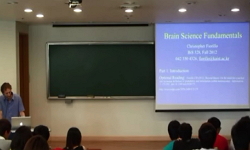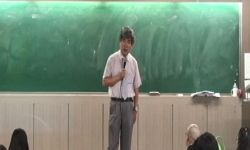From the perspective of brain science, this paper presents the development of a Japanese-English multilingual teaching method for adult learners, especially Korean university students, focusing on a case study of J University. Park (2015a) indicates t...
http://chineseinput.net/에서 pinyin(병음)방식으로 중국어를 변환할 수 있습니다.
변환된 중국어를 복사하여 사용하시면 됩니다.
- 中文 을 입력하시려면 zhongwen을 입력하시고 space를누르시면됩니다.
- 北京 을 입력하시려면 beijing을 입력하시고 space를 누르시면 됩니다.
부가정보
다국어 초록 (Multilingual Abstract)
From the perspective of brain science, this paper presents the development of a Japanese-English multilingual teaching method for adult learners, especially Korean university students, focusing on a case study of J University. Park (2015a) indicates that most university students majoring in Japanese language and literature in Korea strive for the necessity of acquiring both English and Japanese, and the development of teaching methods for simultaneous Japanese and English education. This paper presents a case study of the development of Japanese-English multilingual teaching methods to solve these remaining tasks. First, from the perspective of brain science, (i) adults and children experience different learning methods for L1 and L2/L3; (ii) when adults learn L2/L3, the declarative memory is used, unlike in the case of L1. This differs in children. Therefore, this paper argues that multilingual teaching methods for children and adults should be developed. Moreover, this paper introduces two types of Japanese-English multilingual teaching methods: (i) an immersion program and (ii) a communicative approach-centered blending method aiming to develop and research multilingual teaching methods for adults.
참고문헌 (Reference)
1 박강훈, "한국 일본어학계의 통어론 연구 현황과 과제 - 생성문법론을 중심으로 -" 한국일본어문학회 1 (1): 59-82, 2016
2 박강훈, "한국 성인학습자의 일・영 멀티링구얼 교육 모델 구축을 위한 기반연구" 한국일본어문학회 1 (1): 105-126, 2018
3 윤강구, "일본어, 어떻게 가르칠 것인가" 지식과 교양 2011
4 박강훈, "인공신경망 번역 엔진을 활용한 멀티링구얼 문법 교육 ― 韓・日・英 삼중언어를 중심으로 ―" 한국일본문화학회 (80) : 23-43, 2019
5 이미숙, "이중 언어와 다언어의 교육" 한글파크 2012
6 강은영, "영어 학습자의 탈동기 요인 연구: S대학의 영어회화 수업 사례를 중심으로" 대한영어영문학회 45 (45): 209-235, 2019
7 김현기, "언어학의 실용적 접근: 언어치료학" 한국프랑스학회 7-42, 2006
8 박강훈, "생성문법이론과 인공신경망 번역 알고리즘 - 멀티링구얼 교육 모델에의 적용 -" 한국일어일문학회 108 : 3-22, 2019
9 KBS, "당신이 영어를 진짜 못하는 이유"
10 유덕근, "기억의 특성에서 바라본 외국어학습 - 서술기억과 절차기억을 중심으로" 한국독일어교육학회 (31) : 79-110, 2012
1 박강훈, "한국 일본어학계의 통어론 연구 현황과 과제 - 생성문법론을 중심으로 -" 한국일본어문학회 1 (1): 59-82, 2016
2 박강훈, "한국 성인학습자의 일・영 멀티링구얼 교육 모델 구축을 위한 기반연구" 한국일본어문학회 1 (1): 105-126, 2018
3 윤강구, "일본어, 어떻게 가르칠 것인가" 지식과 교양 2011
4 박강훈, "인공신경망 번역 엔진을 활용한 멀티링구얼 문법 교육 ― 韓・日・英 삼중언어를 중심으로 ―" 한국일본문화학회 (80) : 23-43, 2019
5 이미숙, "이중 언어와 다언어의 교육" 한글파크 2012
6 강은영, "영어 학습자의 탈동기 요인 연구: S대학의 영어회화 수업 사례를 중심으로" 대한영어영문학회 45 (45): 209-235, 2019
7 김현기, "언어학의 실용적 접근: 언어치료학" 한국프랑스학회 7-42, 2006
8 박강훈, "생성문법이론과 인공신경망 번역 알고리즘 - 멀티링구얼 교육 모델에의 적용 -" 한국일어일문학회 108 : 3-22, 2019
9 KBS, "당신이 영어를 진짜 못하는 이유"
10 유덕근, "기억의 특성에서 바라본 외국어학습 - 서술기억과 절차기억을 중심으로" 한국독일어교육학회 (31) : 79-110, 2012
11 박강훈, "韓国の大学における日本語・英語のマルチリンガル教育の試み" 한국일본어문학회 1 (1): 25-44, 2017
12 박강훈, "韓国におけるマルチリンガル教育の可能性-大学生の日本語学習者へのニーズ調査を中心に-" 한국일본언어문화학회 (31) : 89-110, 2015
13 박강훈, "外国語教育の国家職務能力標準(NCS)の 構築における基礎研究" 한국일본어문학회 1 (1): 239-258, 2015
14 中島和子, "マルチリンガル教育への招待" ひつじ書房 2010
15 Kandel. E. R., "The molecular biology of memory storage : a dialogue between genes and synapses" 294 (294): 10-1038, 2001
16 Squire, L. R., "Structure and function of declarative and nondeclarative memory systems" 93 : 13515-13522, 1996
17 Ushioda, E., "Motivation and Second Language Acquisition" 93-125, 2001
18 Baddeley, A. D., "Memory" Psychology Press 2009
19 박강훈, "MOOC 플랫폼을 활용한 일본어 교육의 현황과 전망 - 성인학습자의 日 英 멀티링구얼 교육을 중심으로" 한국일본어문학회 1 (1): 21-43, 2020
20 Chomsky, N., "Lectures on Government and Binding" Foris 1981
21 Daskalovska, N., "Learners Motivation and Interest" 46 : 1187-1191, 2012
22 Krashen, S., "Implicit and explicit learning of language" Academic Press 1994
23 Raabe, H., "Grammatik und ihre Vermittlung im Fremdsprachenunterricht" Band B und C. Fernuniversität 2002
24 Kim, K., "Distinct cortical areas associated with native and second languages" 388 : 171-174, 1997
25 Ullman, M. T., "Contributions of memory circuits to language: the declarative/procedural model" 92 : 231-270, 2004
동일학술지(권/호) 다른 논문
-
- 한국일본어문학회
- 羅工洙
- 2020
- KCI등재
-
일본어 전공자와 비전공자를 대상으로 한 「커뮤니케이션을 위한 일본어교육문법」의 효율성 비교 분석
- 한국일본어문학회
- 裵銀貞
- 2020
- KCI등재
-
複合動詞 「V+つける」に関する考察 ―意味用法および実例数の構成比を中心に―
- 한국일본어문학회
- 大谷由香
- 2020
- KCI등재
-
- 한국일본어문학회
- 上野由香子
- 2020
- KCI등재
분석정보
인용정보 인용지수 설명보기
학술지 이력
| 연월일 | 이력구분 | 이력상세 | 등재구분 |
|---|---|---|---|
| 2026 | 평가예정 | 재인증평가 신청대상 (재인증) | |
| 2021-09-30 | 학술지명변경 | 외국어명 : Korean Japanese of Japanese Language and Literature -> Korean Journal of Japanese Language and Literature |  |
| 2020-01-01 | 평가 | 등재학술지 유지 (재인증) |  |
| 2017-01-01 | 평가 | 등재학술지 유지 (계속평가) |  |
| 2013-01-01 | 평가 | 등재학술지 유지 (등재유지) |  |
| 2010-01-01 | 평가 | 등재학술지 유지 (등재유지) |  |
| 2008-01-01 | 평가 | 등재학술지 유지 (등재유지) |  |
| 2006-01-01 | 평가 | 등재학술지 유지 (등재유지) |  |
| 2003-01-01 | 평가 | 등재학술지 선정 (등재후보2차) |  |
| 2002-01-01 | 평가 | 등재후보 1차 PASS (등재후보1차) |  |
| 2000-07-01 | 평가 | 등재후보학술지 선정 (신규평가) |  |
학술지 인용정보
| 기준연도 | WOS-KCI 통합IF(2년) | KCIF(2년) | KCIF(3년) |
|---|---|---|---|
| 2016 | 0.34 | 0.34 | 0.29 |
| KCIF(4년) | KCIF(5년) | 중심성지수(3년) | 즉시성지수 |
| 0.27 | 0.25 | 0.559 | 0.07 |




 KCI
KCI KISS
KISS







